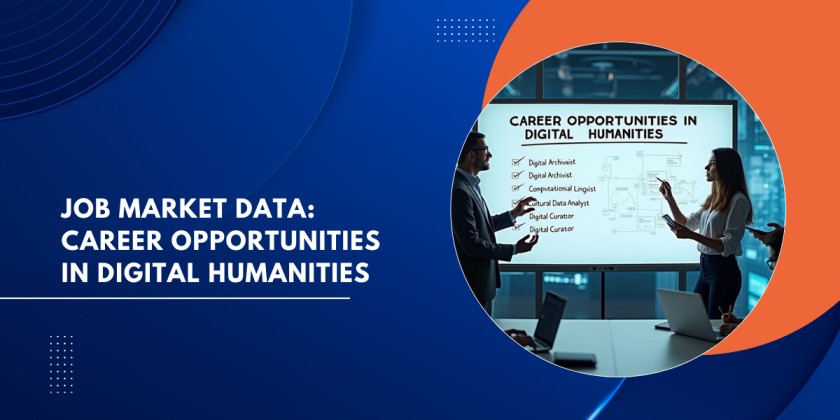Blog written by Preethi Durga, a career strategist and education innovator.
Hey there,
Have you ever thought about how history, literature, and culture are being reimagined in today’s digital world? If you think Digital Humanities (DH) is just about scanning old manuscripts or digitizing museum collections, think again! This field is rapidly evolving, blending cutting-edge technology with traditional humanities to preserve history, analyze cultural shifts, and shape the future of research and education.
If you’re a student, researcher, or simply someone curious about where the humanities meet technology, you’re in the right place. Let’s dive into the game-changing tools, key trends, and career opportunities shaping the future of Digital Humanities.
Industry Spotlight: The Digital Humanities Boom
What if you could walk through the ruins of the Indus Valley Civilization in virtual reality, use AI to decode ancient Sanskrit manuscripts, or trace the evolution of Indian languages over centuries through data visualization? This isn’t just an academic dream—it’s happening right now in India’s rapidly growing Digital Humanities (DH) sector.
Digital Humanities is no longer a niche in India—it’s transforming research, education, and cultural preservation. Universities, museums, and government institutions are investing in AI, data visualization, and immersive technologies to make history and culture more accessible than ever before.
Think about it:
- What if AI could help reconstruct missing portions of the Ajanta and Ellora caves’ ancient paintings?
- Can machine learning analyze scripts from different Indian languages to trace their historical connections?
- Could an interactive timeline of India’s freedom movement, powered by AI and digital storytelling, make history more engaging for students?
These aren’t just ideas—they’re already happening!
Real-World Digital Humanities Projects in India
Some real-world Digital Humanities projects in India include:
- Project Madurai – a digitized collection of ancient Tamil classics.
- Bichitra– a digital variorum of Rabindranath Tagore’s works.
- Cinemaazi– a digital repository for regional vintage Indian cinema; all contributing to the preservation and analysis of South Asian cultural heritage through digital tools.
Key Trends and Advancements:
- AI-Powered Research: AI is being used to analyze historical texts, detect patterns in literature, and even predict how languages evolve. Google’s DeepMind has been training AI to read ancient Greek texts that humans struggle to decode!
- VR and AR in Cultural Heritage: Museums and universities are using Virtual Reality (VR) and Augmented Reality (AR) to recreate historical experiences. Want to walk through ancient Rome or a lost medieval castle? Now you can!
- Data Visualization for History: Mapping tools like Palladio and GIS allow historians to track historical trade routes, migration patterns, and war movements in interactive ways.
Future Projections:
The demand for digital archivists, AI researchers in humanities, and data-driven cultural analysts is on the rise in India. According to the National Digital Library of India (NDLI) and Digital India Initiative, the push for digitizing historical records, manuscripts, and cultural heritage is expected to create over 20,000 new jobs in the next decade.
Additionally, with India’s digital economy projected to reach $1 trillion by 2030, the integration of AI and big data in humanities research will see a significant boost. This means more career opportunities for professionals who can merge technology with cultural and historical analysis, making Digital Humanities a promising career path in India.
Are you interested in pursuing a career in Digital Humanities? Book a session with our career experts at NextMovez!
Essential Digital Humanities Tools
To succeed in Digital Humanities, you need the right tools. Here are some of the most popular Digital Humanities tools that researchers, students, and professionals are using today:
- Voyant Tools – A text analysis tool that helps identify patterns, word frequencies, and correlations in large datasets of literary and historical texts.
- Gephi – The “Photoshop for data,” this tool is great for network analysis and visualizing relationships between historical events and figures.
- Palladio – Developed by Stanford, this data visualization tool helps researchers map and analyze historical and cultural trends.
- Omeka – A must-have for digital archivists, Omeka allows users to build digital exhibits for museums and research projects.
- Google Ngram Viewer – Tracks word usage over centuries, allowing researchers to study language evolution and cultural trends.
Pro Tip: If you’re new to DH, start with Voyant Tools (for text analysis) and Omeka (for digital collections). These tools are beginner-friendly and widely used in academia.
Job Market Data: Career Opportunities in Digital Humanities

Let’s talk about jobs. You might be wondering, “Can I actually build a career in Digital Humanities?” The answer is YES! DH professionals are in high demand across industries.
Job Market Insights:
- Digital Archivists and Curators: According to the U.S. Bureau of Labor Statistics, careers in digital archiving are projected to grow 19% by 2030 as institutions move towards digital preservation.
- AI and Data Specialists in Humanities: AI-driven text analysis and historical data mapping are opening new career paths in academic research, journalism, and cultural institutions.
- Cultural Analysts and UX Designers: Companies like Google, Apple, and Meta are hiring humanities professionals to enhance AI interactions and user experiences.
Where Can You Work?
Digital Humanities is an interdisciplinary field, opening up diverse career paths across academia, cultural institutions, technology, and media. Here are some key areas where professionals in this field are making an impact:
1️. Universities & Research Institutes
- Many universities are establishing Digital Humanities Labs to explore AI-driven text analysis, historical data visualization, and computational linguistics.
- Roles include DH Researchers, AI Specialists in Humanities, and Academic Consultants working on projects that merge cultural studies with digital innovation.
2️. Museums & Libraries
- With the rise of digital archives, institutions like the National Museum of India and the National Digital Library of India (NDLI) are hiring Digital Curators and Metadata Specialists to digitize and preserve historical documents, artworks, and manuscripts.
- Professionals in this space focus on organizing and managing digital collections, ensuring long-term accessibility to cultural heritage materials.
3️. Tech Companies
- Companies like Google, Microsoft, and TCS are integrating AI and machine learning into humanities-based projects, hiring AI Trainers for Humanities Data, UX Researchers, and Computational Linguists.
- These professionals work on developing AI tools for language processing, digital storytelling, and enhancing AI-human interaction through cultural understanding.
4️. Publishing & Journalism
- The media industry is rapidly adopting data-driven journalism and AI-assisted content analysis.
- Roles such as Data Journalists, Digital Content Analysts, and AI-Powered Editorial Consultants are emerging to help publishers analyze trends in literature, track misinformation, and create interactive storytelling experiences.
From academic research to cutting-edge tech and media, Digital Humanities is creating exciting career opportunities for those who can bridge the gap between culture and technology.
Salary Data in India
In India, Digital Humanities professionals can expect salaries ranging from ₹6 LPA to ₹15 LPA, depending on their expertise and industry. According to job market data from Naukri.com and LinkedIn, professionals working in AI-driven humanities research, digital archiving, and UX research in tech companies earn on the higher end of the scale, with salaries reaching ₹18-₹20 LPA for senior roles. Digital curators, data journalists, and content analysts in media and cultural institutions typically earn between ₹5 LPA to ₹12 LPA, with increasing demand for specialists in AI-powered language processing and cultural data analysis.
Looking for Digital Humanities Jobs? Check out job boards like H-Net, LinkedIn, and university career pages for new openings.
Expert Insights: What Industry Professionals Are Saying?
To understand how Digital Humanities (DH) is evolving in India, we reached out to experts from academia, technology, and cultural preservation. Here’s what they had to say:
A renowned professor of Digital Humanities, JNU
“India is sitting on a vast cultural and historical repository that needs to be digitized. From ancient manuscripts to regional folk traditions, Digital Humanities is playing a crucial role in preserving our heritage. The biggest challenge? We need more trained professionals who can merge historical knowledge with AI, NLP, and data analytics.”
Digital Archivist, National Museum of India
“Museums and libraries across India are rapidly digitizing their collections. We are using VR to create immersive exhibits and AI to catalog historical texts. We need young professionals who understand both culture and technology to drive these projects forward.”
Data Journalist, The Hindu
“Data-driven storytelling is the future of journalism. Whether it’s tracking misinformation, visualizing historical events, or analyzing election trends, Digital Humanities tools like data visualization and AI-powered text analysis are becoming essential for modern journalism.”
These insights make it clear—Digital Humanities in India is no longer just an academic field; it’s a growing industry with immense potential in research, technology, and media.
How to Get Started in Digital Humanities?
If you’re excited about Digital Humanities (DH) and want to explore it as a career, here’s how you can start your journey and build expertise in this evolving field:
1️. Learn the Basics
Before diving into specialized tools, it’s important to understand the core concepts of Digital Humanities and how technology is transforming traditional humanities disciplines.
Where to Start?
- Enroll in free online courses from platforms like Coursera, edX, and Udemy that cover the fundamentals of DH.
- Follow DH researchers, projects, and blogs to stay updated on trends and advancements.
Example: If you’re interested in historical research, check out courses like “Text Analysis for Digital Humanities” on edX to learn how AI can analyze literary texts.
2️. Master Digital Humanities Tools
Digital Humanities relies on specialized software and platforms to analyze, visualize, and present cultural data. Learning these tools will give you a competitive edge.
Essential DH Tools to Start With:
- Voyant Tools – A beginner-friendly text analysis tool for exploring word frequency and patterns in literature and historical texts.
- Palladio – A data visualization tool developed by Stanford for mapping historical trends and cultural interactions.
- Omeka – A widely used digital archiving platform that helps create and manage online exhibits for museums and libraries.
Example: If you’re fascinated by literature, use Voyant Tools to analyze common themes in Tagore’s works or Mahatma Gandhi’s speeches.
3️. Build a Portfolio with Small Projects
Hands-on experience is key! Start by creating small Digital Humanities projects that showcase your ability to work with digital tools.
Ideas for Digital Humanities Projects:
- Create a digital archive of historical newspapers or photographs from a local museum.
- Develop an interactive map that visualizes historical trade routes, migration patterns, or war movements.
- Use AI for text analysis – analyze a collection of old letters or books to discover patterns in language and sentiment.
Example: Create a visual timeline of India’s independence movement using Palladio, or build an interactive archive of Indian folk tales using Omeka.
4️. Network with Professionals & Join DH Communities
Building connections in the DH space is crucial for learning, collaborations, and job opportunities.
Where to Connect?
- HASTAC (Humanities, Arts, Science, and Technology Alliance and Collaboratory) – A global network for Digital Humanities researchers.
- DH Conferences (ADHO, DHIndia, DH2024) – Attend events to meet scholars, tech professionals, and industry leaders.
- Twitter and LinkedIn – Follow hashtags like #DigitalHumanities and #DHIndia to engage with experts and stay updated.
Example: Join HASTAC forums and connect with DH scholars on Twitter to discover new projects, internships, and research opportunities.
5️. Apply for Digital Humanities Jobs & Internships
Once you’ve built your skills and portfolio, start looking for job openings and internships in universities, research labs, museums, and tech firms.
Where to Find DH Jobs?
- H-Net (Humanities & Social Sciences Online) – A leading job board for DH professionals.
- University Research Labs – Many institutions have Digital Humanities labs hiring interns and research assistants.
- Museums, Libraries, and Cultural Institutions – These organizations often look for digital archivists and content curators.
Example: Apply for internships at institutions like the National Digital Library of India (NDLI) or Ashoka University’s Digital Humanities Lab to gain real-world experience.
Final Thoughts: Why Digital Humanities Matters?
The Digital Humanities revolution is just beginning, and it’s an exciting time to be part of it. Whether you’re a student, researcher, or tech enthusiast, there’s a place for you in this field.
With AI, VR, and data science transforming the humanities, the opportunities for new careers, research breakthroughs, and digital storytelling are limitless. So, are you ready to explore, innovate, and redefine how we engage with human culture?
We’d love to hear your thoughts! What excites you most about Digital Humanities? Reply to this newsletter or connect with us on LinkedIn.
Resources
- Coursera: Digital Humanities Specialization
- edX: AI for Humanities
- National Digital Library of India (NDLI) Research Data
- Journal of Digital Humanities
- Digital Humanities Quarterly (DHQ)
- Journal of Cultural Analytics
Want to Stay Updated? Get in touch for more insights on Digital Humanities careers, tools, and trends!






















